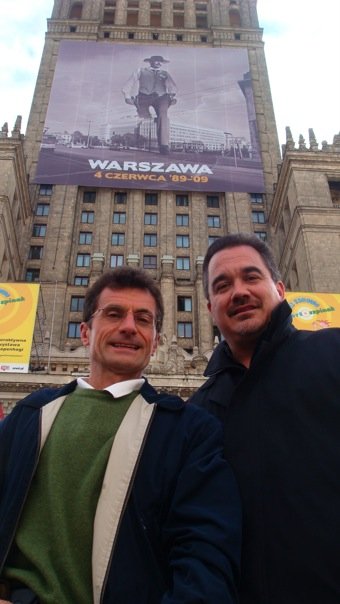Eight SDSU Homeland Security Program graduate students, led by professors Jeffrey McIllwain and Cezar Ornatowski, depart for Poland for a travel-study course, “From Totalitarianism to Democracy: The Case of Poland.” The group will travel for sixteen days and provide real-time blog updates to the VizCenter web page as a way to share their “lessons learned” in Warsaw, Krakow, and Gdansk. This first post sets the stage for what the students will learn over the next couple of weeks. SEE STUDENT BLOG
Why study Poland? Central/Eastern Europe in a vital new region of the European Union, a region where the political and economic transformation created new political entities and which is an invaluable laboratory for the study of a wide variety of issues. Poland is especially important since it is the largest and most populous country in the region and the traditional “buffer” state between “West” and “East,” and currently the eastern frontier of the European Union. The post-9/11 transformation of American foreign and security policies places a substantial emphasis on alliances with the countries of Central and Eastern Europe, especially Poland. The U.S. and Poland have also entered into a major security agreement that will make Poland a key component in European defense and will provide for the modernization of Poland’s military and security structures. Poland’s decision to enter such a strong alliance with the U.S. has angered Russia, which views Poland and other former Warsaw Pact allies and Soviet Republics as part of its sphere of influence (a Russian view that has motivated Poland and fellow Visegrad Group members Hungary, Slovakia, and Czech Republic to move towards the U.S. in the first place). The students are also studying Poland because of its tragic yet inspiring history during the 20th century which provides many valuable lessons on such pertinent post-9/11 issues as the violent impact of totalitarian ideologies and ethnic and racial hatred on a nation and how subjugated peoples can pursue liberty in the face of overwhelming odds and successfully transition to a strong, vibrant democracy.
The host institution for the program is the Center for East European Studies at Warsaw University (http://www.studium.uw.edu.pl). The Center was established by the resolution of the Warsaw University (the most highly rated university in Poland) Senate in 1990 and is devoted to the study of regional issues, including history, culture, politics, and education. In includes a five-year MA program and a two-year Ph.D. program, as well as a School of Eastern Languages (offering instruction in 22 languages). It maintains a scholarship program for students from the former Soviet area, conducts regular exchange and travel programs throughout the region, as well as organizes international seminars and conferences (including the annual Warsaw East European Conference, a major event with participants from all over the world) in cooperation with universities from all over Central/Eastern Europe, the former Soviet Union, and Eurasian and Asian countries such as Mongolia Uzbekistan, Azerbaijan, Armenia, and Georgia). It also publishes a major academic journal in Eastern European Studies.
The specific goals of the program are to familiarize HSEC students with:
• Polish and Central/Eastern European history, esp. recent history (World War I, World War II, the resistance, Warsaw Uprising, ethnic cleansing and the Holocaust, Soviet occupation, the communist period, anti-communist resistance, and the problematic of political transformation and European integration, Schengen, energy politics, and the Visegrad Group);
• Poland’s (and the region’s) geopolitical position and international policy/security issues on the eastern borders of the European union;
• Current political and economic issues in Poland and Central/Eastern Europe, esp. regarding Poland’s relationships with the United States, the European Union, the Visegard Group, and Russia and Germany;
• The roles of ideology, ethnic identity, and propaganda in Poland’s totalitarian past and democratic present;
• The impact of science and technology on all of the above.


